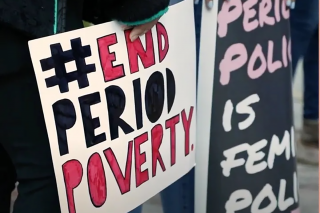In an August 2023 op-ed in The Rag, Economics and Political Science double major Katarina Sousa ’24 writes, “We do not live in a society that centers, or even acknowledges, the hardships faced by those who menstruate. . . even though half of the population menstruates, a culture of shame prevents open conversations and solutions.”
Sousa draws attention to the fact that, while public restrooms supply complimentary toilet paper, they rarely provide an equally essential item: period products. Sousa’s research and activism concerning menstrual equity cast this disparity into relief.
Piquing her interest and becoming a research assistant
Her interest in menstrual equity is political, but also personal. “I have had so many friends and family members share with me their shame when getting their period and smuggling in tampons at school. These anecdotes help you realize how strong the culture of shame is around menstruation. Menstruation is a process that affects more than 50% of the population, so having the capacity and advocacy to improve the lives of my family, friends, and community motivates me.”
Charlotte Powley, Assistant Professor of Public Health at Simmons, is another key source of motivation for Sousa. After reading a 2022 Simmons News interview in which Powley discussed her research on menstrual equity, Sousa decided to approach Powley to see if she could use a research assistant. To Sousa’s delight, Powley agreed.
Together, Sousa and Powley researched access to menstrual products at public high schools in the United States (an extension of Powley’s dissertation). “We are working on several projects, including the Fall River Report, which incorporates data from focus groups involving Massachusetts menstruators. We address issues of access, taboo, and shame, and hope to publish this research in a peer-reviewed journal,” explains Sousa.
Advocating for change close to home
Sousa and Powley are also collaborating with MassNow, a grassroots nonprofit organization that works to advance intersectional feminist activism in Massachusetts. Specifically, they are co-authoring a report detailing the most inclusive and effective practices and policies regarding access to free menstrual products in Massachusetts schools.
As a Massachusetts native, Sousa is particularly passionate about addressing period poverty in her home state. “Period poverty exists when menstruators lack the product(s) they need to manage menstruation. For example, not being able to afford pads, tampons, and pain medications, as well as not having access to private washing facilities, all constitute period poverty,” says Sousa.
In her community activism, Sousa vigorously supports the I AM Bill. First proposed in 2019 and currently under consideration by the state legislature, this bill, if enacted, would require all public schools, prisons, and homeless shelters to provide free menstrual products to all menstruating individuals. “Currently, 24 states and Washington D.C. have some kind of provision for schools, so the I AM Bill would allow Massachusetts to join that coalition. I think this would be an incredible win for menstrual equity in the state of Massachusetts,” remarks Sousa.
Moreover, Sousa notes that the I AM Bill employs very intentional language. Instead of “menstruating girls” or “menstruating women,” the bill invokes “menstruating individuals.” As Sousa explains, “not all people who menstruate are women, and not all women menstruate. This language is more accurate and inclusive, and it helps de-stigmatize and reduce the taboos associated with menstruation and period products.”
Beyond the state of Massachusetts, Sousa emphasizes the need for menstrual advocacy across the globe. Her op-ed appeared in The Rag, the flagship publication of PERIOD, an international global menstrual equity organization. “PERIOD focuses on the areas of advocacy, education, and service to facilitate period product distribution and endorse the de-stigmatization of menstruation,” says Sousa.
Shaping research through Political Science coursework
Sousa’s experience at Simmons, and especially its women-centered environment, fuels her advocacy further. “I love the Boston area and I wanted to attend a historically women’s college,” she explains. “Simmons was my dream school; it encapsulates everything I want in a college. I feel very empowered here and love all the things we can do as Sharks around Boston.” Currently, Sousa is taking coursework in Political Science with Associate Professor of Practice Kristina Pechulis and Associate Professor and Chair of Political Science and International Relations Lena Zuckerwise. She says that these courses sharpened her understanding of policy work and its impact on incarcerated individuals, and shaped her research on menstrual equity.
Sousa urges Simmons students to take action at the local level. “We recently held the 4th annual Rally to End Period Poverty at the State House. People can also join the Massachusetts Menstrual Equity Coalition. We have monthly meetings and sub-committees in which high school and college students can get involved,” she says. “Email your state representatives to urge them to support these measures to achieve menstrual equity in Massachusetts.”

